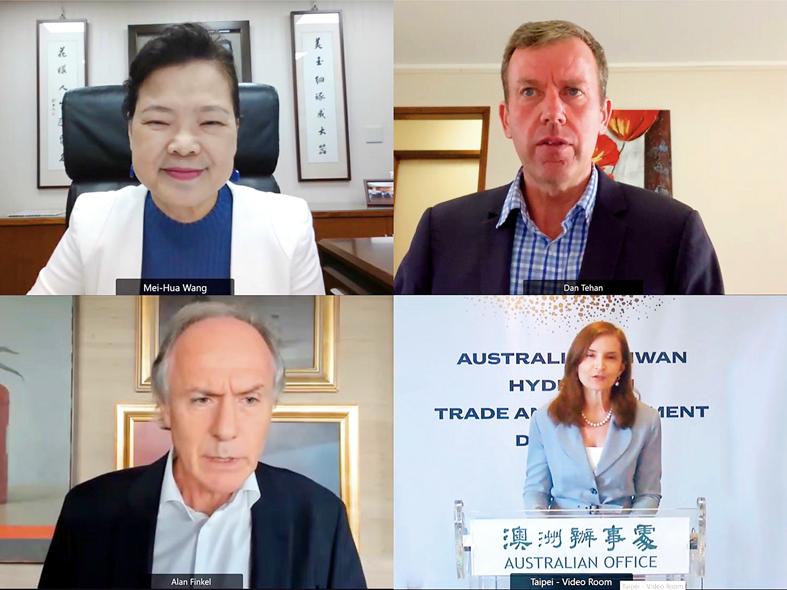Taiwan and Australia yesterday discussed opportunities for bilateral cooperation on clean energy, including on the development of hydrogen-based technologies, and agreed to expand their trade and investment efforts in such fields.
The talks, held as part of the bilateral Hydrogen Trade and Investment Dialogue, also included strategies for increasing renewable energy, said the Australian Office in Taipei, which hosted the videoconference.
In the past few years, cooperation between Taiwan and Australia has expanded to offshore wind energy, and Taiwan plans to make a greater push for partnerships with other nations on the application and development of hydrogen energy, Minister of Economic Affairs Wang Mei-hua (王美花) told the forum.

Photo courtesy of the Australian Office Taipei
Describing Taiwan and Australia as “important partners in energy,” Wang said that 27 percent of Taiwan’s liquefied natural gas and 70 percent of its coal comes from Australia.
The partnership does not end with traditional energy resources, Wang said.
“Taiwan’s first offshore wind farm was built in collaboration with Australia’s Macquarie Group,” she said. “We hope to keep working together as Taiwan increases its renewable energy efforts.”
Australia is an important exporter of energy, minerals and agricultural products to Taiwan, while Taiwan exports high-tech products to Australia.
Over the past five years, trade has grown at an average of 10 percent per year, while bilateral investment has grown at an average of 13 percent per year, the Ministry of Economic Affairs said.
Australia is Taiwan’s largest source for energy-related products, and Taiwan is Australia’s fourth-largest market for energy.
However, as the countries try to decarbonize, the talks also centered around trade and investment cooperation, including in wind and solar power, and in “emerging low-emission technologies such as hydrogen,” the Australian Office said in a statement.
The Australian delegation at the forum was led by Australian Minister for Trade, Tourism and Investment Dan Tehan and Special Adviser on Low Emissions Technology Alan Finkel, who gave the keynote address at the event on the challenges and opportunities of hydrogen.
“Australia and Taiwan are natural energy partners and are in a strong position to maximize these opportunities, as the world moves toward a net-zero emissions future,” the office said.
The dialogue is a continuation of the Joint Energy and Minerals, Trade and Investment Cooperation consultations, with the common goal of fostering a multilevel relationship between Taiwan and Australia in energy, the ministry said.

In Italy’s storied gold-making hubs, jewelers are reworking their designs to trim gold content as they race to blunt the effect of record prices and appeal to shoppers watching their budgets. Gold prices hit a record high on Thursday, surging near US$5,600 an ounce, more than double a year ago as geopolitical concerns and jitters over trade pushed investors toward the safe-haven asset. The rally is putting undue pressure on small artisans as they face mounting demands from customers, including international brands, to produce cheaper items, from signature pieces to wedding rings, according to interviews with four independent jewelers in Italy’s main

Japanese Prime Minister Sanae Takaichi has talked up the benefits of a weaker yen in a campaign speech, adopting a tone at odds with her finance ministry, which has refused to rule out any options to counter excessive foreign exchange volatility. Takaichi later softened her stance, saying she did not have a preference for the yen’s direction. “People say the weak yen is bad right now, but for export industries, it’s a major opportunity,” Takaichi said on Saturday at a rally for Liberal Democratic Party candidate Daishiro Yamagiwa in Kanagawa Prefecture ahead of a snap election on Sunday. “Whether it’s selling food or

CONCERNS: Tech companies investing in AI businesses that purchase their products have raised questions among investors that they are artificially propping up demand Nvidia Corp chief executive officer Jensen Huang (黃仁勳) on Saturday said that the company would be participating in OpenAI’s latest funding round, describing it as potentially “the largest investment we’ve ever made.” “We will invest a great deal of money,” Huang told reporters while visiting Taipei. “I believe in OpenAI. The work that they do is incredible. They’re one of the most consequential companies of our time.” Huang did not say exactly how much Nvidia might contribute, but described the investment as “huge.” “Let Sam announce how much he’s going to raise — it’s for him to decide,” Huang said, referring to OpenAI

The global server market is expected to grow 12.8 percent annually this year, with artificial intelligence (AI) servers projected to account for 16.5 percent, driven by continued investment in AI infrastructure by major cloud service providers (CSPs), market researcher TrendForce Corp (集邦科技) said yesterday. Global AI server shipments this year are expected to increase 28 percent year-on-year to more than 2.7 million units, driven by sustained demand from CSPs and government sovereign cloud projects, TrendForce analyst Frank Kung (龔明德) told the Taipei Times. Demand for GPU-based AI servers, including Nvidia Corp’s GB and Vera Rubin rack systems, is expected to remain high,